人教版九年级全册Unit 1 How can we become good learners 综合素质评价(含解析)
文档属性
| 名称 | 人教版九年级全册Unit 1 How can we become good learners 综合素质评价(含解析) | 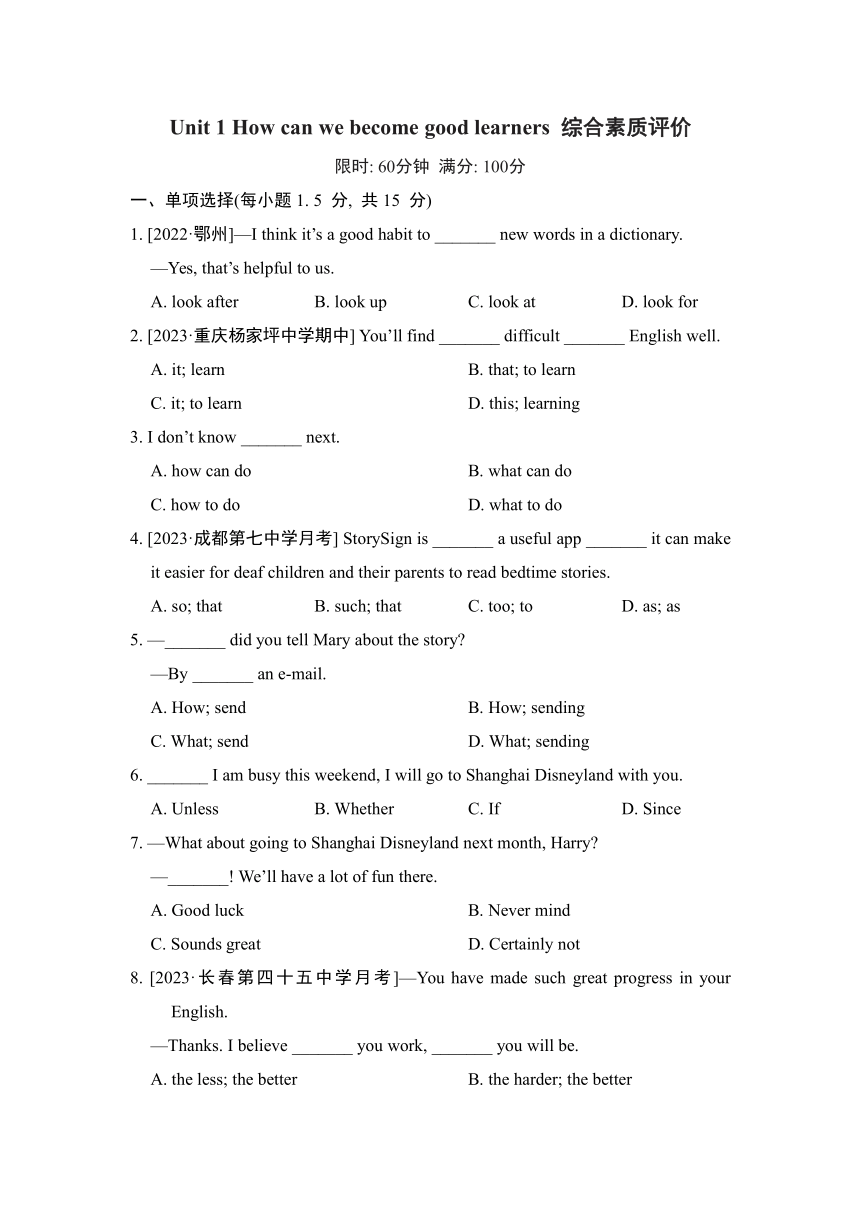 | |
| 格式 | doc | ||
| 文件大小 | 92.0KB | ||
| 资源类型 | 教案 | ||
| 版本资源 | 人教新目标(Go for it)版 | ||
| 科目 | 英语 | ||
| 更新时间 | 2023-03-10 19:43:25 | ||
图片预览

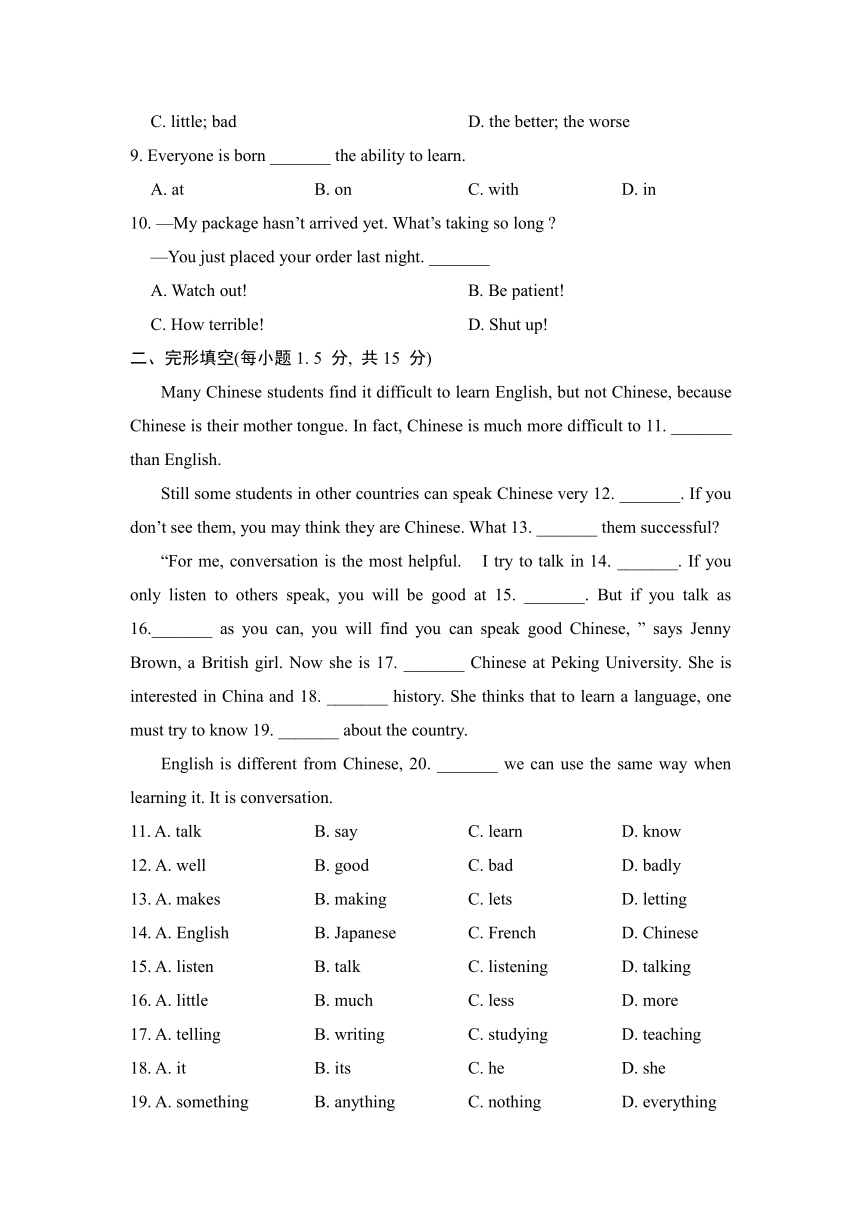
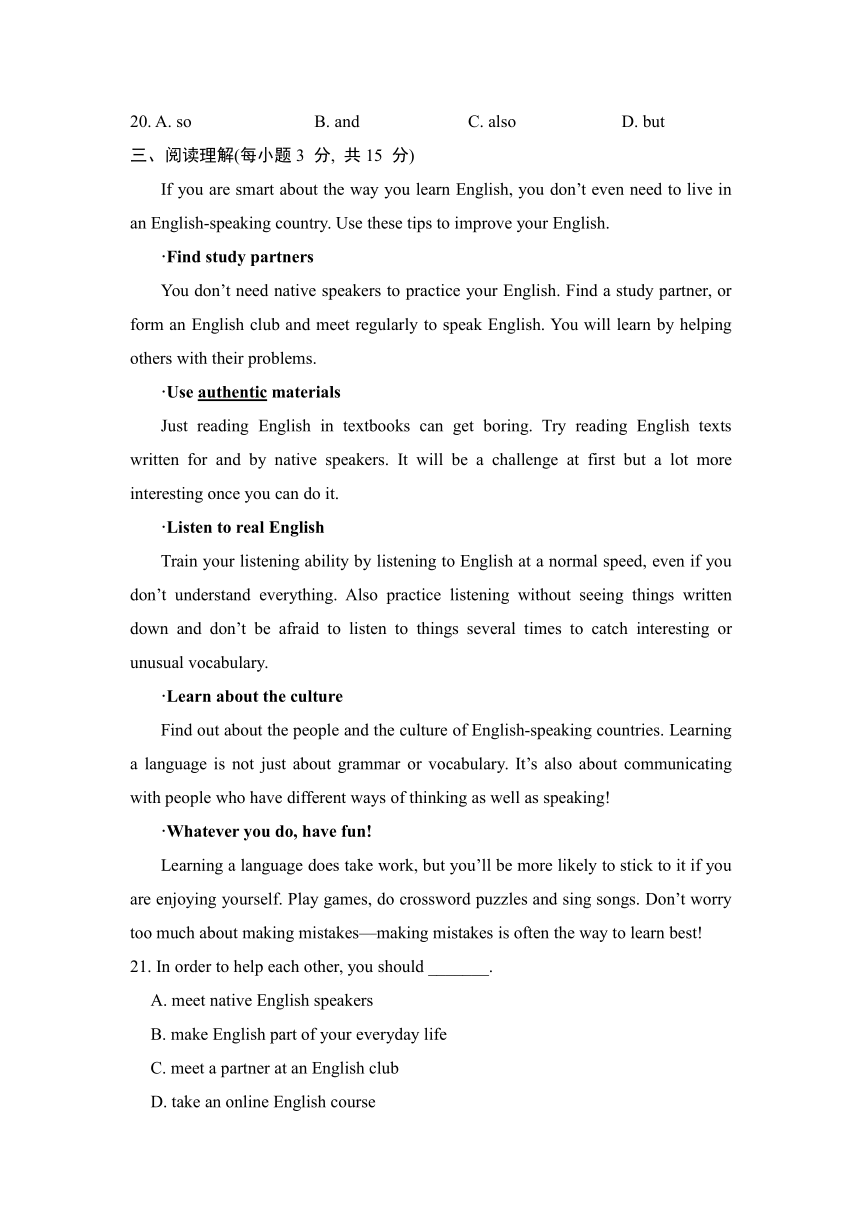
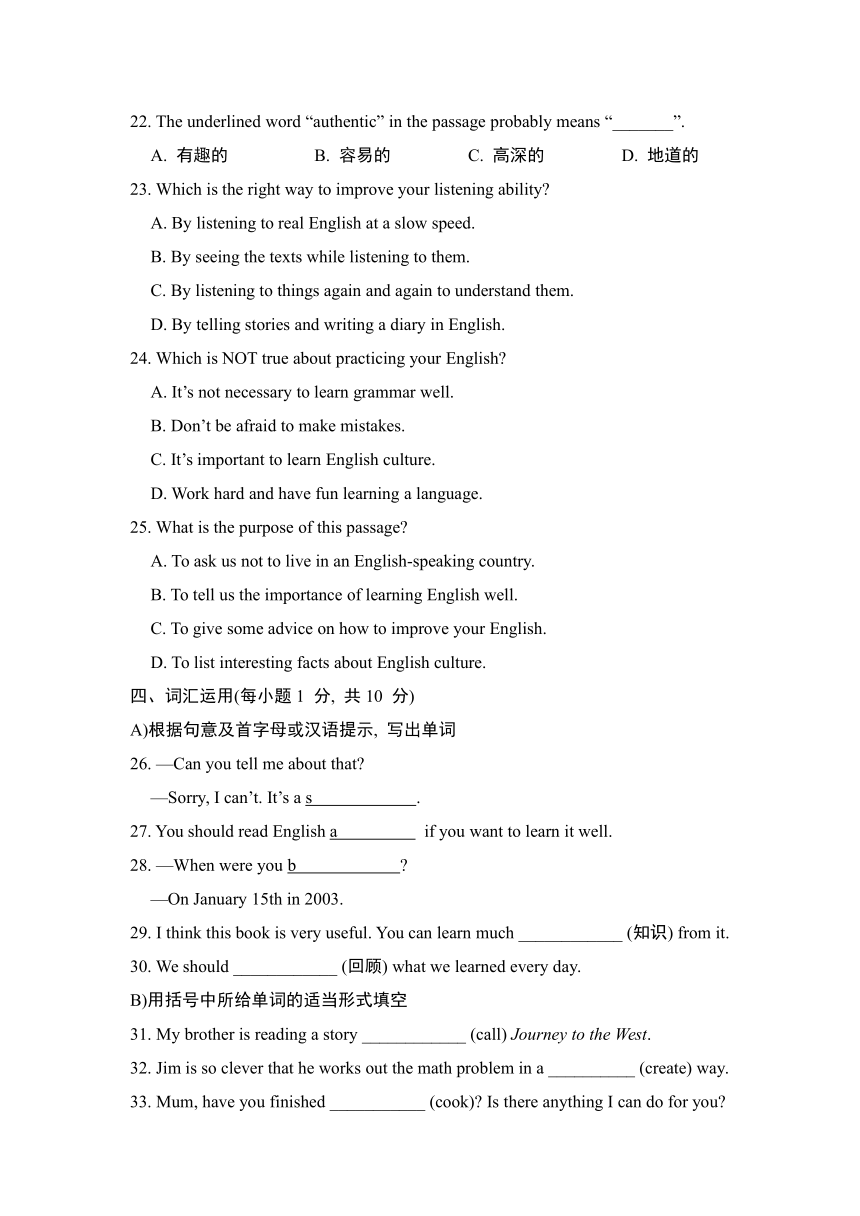
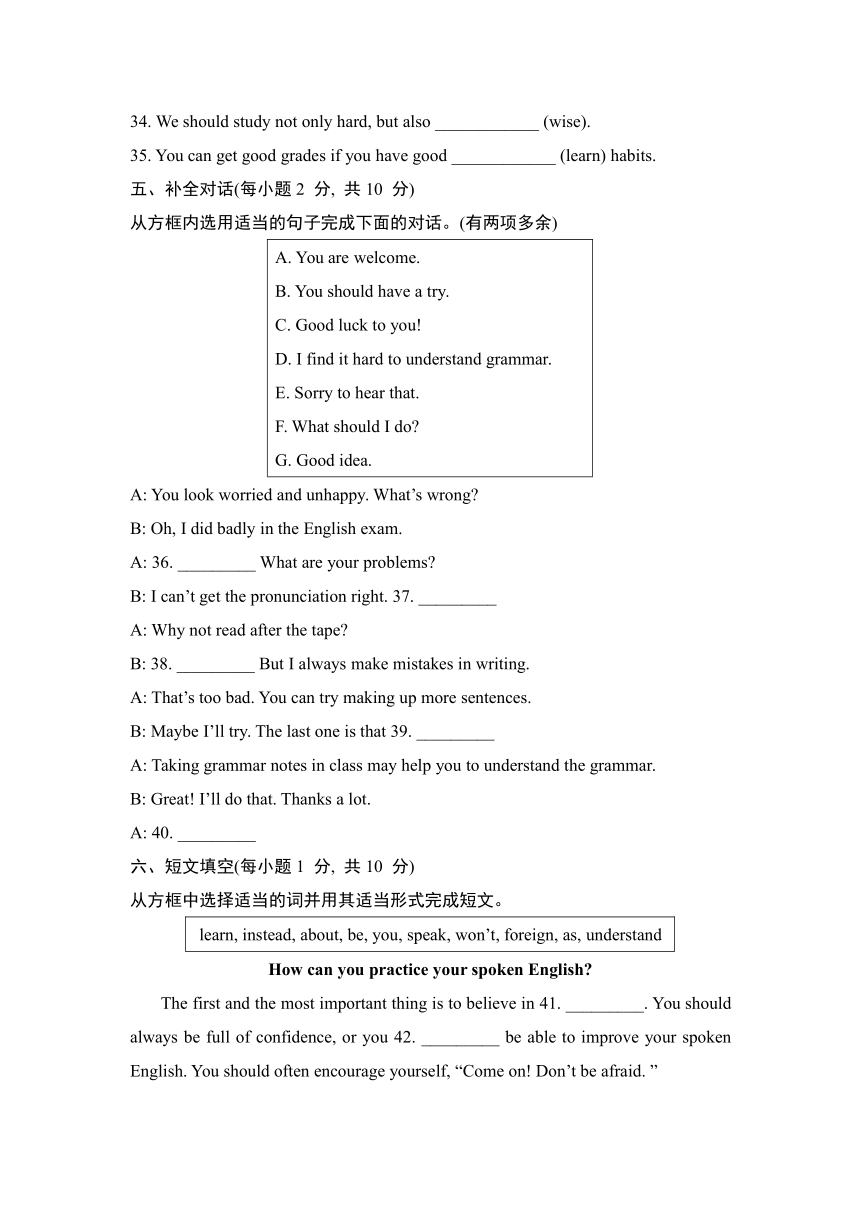
文档简介
Unit 1 How can we become good learners 综合素质评价
限时: 60分钟 满分: 100分
一、单项选择(每小题1. 5 分, 共15 分)
1. [2022·鄂州]—I think it’s a good habit to _______ new words in a dictionary.
—Yes, that’s helpful to us.
A. look after B. look up C. look at D. look for
2. [2023·重庆杨家坪中学期中] You’ll find _______ difficult _______ English well.
A. it; learn B. that; to learn
C. it; to learn D. this; learning
3. I don’t know _______ next.
A. how can do B. what can do
C. how to do D. what to do
4. [2023·成都第七中学月考] StorySign is _______ a useful app _______ it can make it easier for deaf children and their parents to read bedtime stories.
A. so; that B. such; that C. too; to D. as; as
5. —_______ did you tell Mary about the story
—By _______ an e-mail.
A. How; send B. How; sending
C. What; send D. What; sending
6. _______ I am busy this weekend, I will go to Shanghai Disneyland with you.
A. Unless B. Whether C. If D. Since
7. —What about going to Shanghai Disneyland next month, Harry
—_______! We’ll have a lot of fun there.
A. Good luck B. Never mind
C. Sounds great D. Certainly not
8. [2023·长春第四十五中学月考]—You have made such great progress in your English.
—Thanks. I believe _______ you work, _______ you will be.
A. the less; the better B. the harder; the better
C. little; bad D. the better; the worse
9. Everyone is born _______ the ability to learn.
A. at B. on C. with D. in
10. —My package hasn’t arrived yet. What’s taking so long
—You just placed your order last night. _______
A. Watch out! B. Be patient!
C. How terrible! D. Shut up!
二、完形填空(每小题1. 5 分, 共15 分)
Many Chinese students find it difficult to learn English, but not Chinese, because Chinese is their mother tongue. In fact, Chinese is much more difficult to 11. _______ than English.
Still some students in other countries can speak Chinese very 12. _______. If you don’t see them, you may think they are Chinese. What 13. _______ them successful
“For me, conversation is the most helpful. I try to talk in 14. _______. If you only listen to others speak, you will be good at 15. _______. But if you talk as 16._______ as you can, you will find you can speak good Chinese, ” says Jenny Brown, a British girl. Now she is 17. _______ Chinese at Peking University. She is interested in China and 18. _______ history. She thinks that to learn a language, one must try to know 19. _______ about the country.
English is different from Chinese, 20. _______ we can use the same way when learning it. It is conversation.
11. A. talk B. say C. learn D. know
12. A. well B. good C. bad D. badly
13. A. makes B. making C. lets D. letting
14. A. English B. Japanese C. French D. Chinese
15. A. listen B. talk C. listening D. talking
16. A. little B. much C. less D. more
17. A. telling B. writing C. studying D. teaching
18. A. it B. its C. he D. she
19. A. something B. anything C. nothing D. everything
20. A. so B. and C. also D. but
三、阅读理解(每小题3 分, 共15 分)
If you are smart about the way you learn English, you don’t even need to live in an English-speaking country. Use these tips to improve your English.
·Find study partners
You don’t need native speakers to practice your English. Find a study partner, or form an English club and meet regularly to speak English. You will learn by helping others with their problems.
·Use authentic materials
Just reading English in textbooks can get boring. Try reading English texts written for and by native speakers. It will be a challenge at first but a lot more interesting once you can do it.
·Listen to real English
Train your listening ability by listening to English at a normal speed, even if you don’t understand everything. Also practice listening without seeing things written down and don’t be afraid to listen to things several times to catch interesting or unusual vocabulary.
·Learn about the culture
Find out about the people and the culture of English-speaking countries. Learning a language is not just about grammar or vocabulary. It’s also about communicating with people who have different ways of thinking as well as speaking!
·Whatever you do, have fun!
Learning a language does take work, but you’ll be more likely to stick to it if you are enjoying yourself. Play games, do crossword puzzles and sing songs. Don’t worry too much about making mistakes—making mistakes is often the way to learn best!
21. In order to help each other, you should _______.
A. meet native English speakers
B. make English part of your everyday life
C. meet a partner at an English club
D. take an online English course
22. The underlined word “authentic” in the passage probably means “_______”.
A. 有趣的 B. 容易的 C. 高深的 D. 地道的
23. Which is the right way to improve your listening ability
A. By listening to real English at a slow speed.
B. By seeing the texts while listening to them.
C. By listening to things again and again to understand them.
D. By telling stories and writing a diary in English.
24. Which is NOT true about practicing your English
A. It’s not necessary to learn grammar well.
B. Don’t be afraid to make mistakes.
C. It’s important to learn English culture.
D. Work hard and have fun learning a language.
25. What is the purpose of this passage
A. To ask us not to live in an English-speaking country.
B. To tell us the importance of learning English well.
C. To give some advice on how to improve your English.
D. To list interesting facts about English culture.
四、词汇运用(每小题1 分, 共10 分)
A)根据句意及首字母或汉语提示, 写出单词
26. —Can you tell me about that
—Sorry, I can’t. It’s a s .
27. You should read English a if you want to learn it well.
28. —When were you b
—On January 15th in 2003.
29. I think this book is very useful. You can learn much ____________ (知识) from it.
30. We should ____________ (回顾) what we learned every day.
B)用括号中所给单词的适当形式填空
31. My brother is reading a story ____________ (call) Journey to the West.
32. Jim is so clever that he works out the math problem in a __________ (create) way.
33. Mum, have you finished ___________ (cook) Is there anything I can do for you
34. We should study not only hard, but also ____________ (wise).
35. You can get good grades if you have good ____________ (learn) habits.
五、补全对话(每小题2 分, 共10 分)
从方框内选用适当的句子完成下面的对话。(有两项多余)
A. You are welcome. B. You should have a try. C. Good luck to you!D. I find it hard to understand grammar. E. Sorry to hear that. F. What should I do G. Good idea.
A: You look worried and unhappy. What’s wrong
B: Oh, I did badly in the English exam.
A: 36. _________ What are your problems
B: I can’t get the pronunciation right. 37. _________
A: Why not read after the tape
B: 38. _________ But I always make mistakes in writing.
A: That’s too bad. You can try making up more sentences.
B: Maybe I’ll try. The last one is that 39. _________
A: Taking grammar notes in class may help you to understand the grammar.
B: Great! I’ll do that. Thanks a lot.
A: 40. _________
六、短文填空(每小题1 分, 共10 分)
从方框中选择适当的词并用其适当形式完成短文。
learn, instead, about, be, you, speak, won’t, foreign, as, understand
How can you practice your spoken English
The first and the most important thing is to believe in 41. _________. You should always be full of confidence, or you 42. _________ be able to improve your spoken English. You should often encourage yourself, “Come on! Don’t be afraid. ”
You should never lose heart and never give up.
Maybe you are afraid of losing face, but you should remember since we are students and we are 43. _________ English, there is no need to worry 44. _________ anything. You must always be active in practice. It’s normal that your pronunciation can’t be as good 45. _________ that of native people, because we are Chinese. And we don’t have chances to live in 46. _________ countries and talk with people there. But you must know that the main aim to study English is to make ourselves 47._________ other people. You should believe that native speakers will not laugh at you; 48. _________, they will encourage you. So if you are brave enough, you’ll certainly make rapid progress in your 49. _________ English.
Don’t 50. _________ shy or afraid! Just have a try.
七、任务型阅读(每小题2 分, 共10 分)
Tips for Writing Better Articles
Many of us don’t spend a lot of time improving our writing skills. This can be a problem when we hand in our articles. Good writing skills will help us improve our grades and benefit us later in life. 51. ________
Make good word choices. When we’re not sure which word is the right one for a sentence, look it up in a dictionary. Many of us choose words in a hurry and don’t spend time deciding if they’re proper. 52. ________
Check facts. If we want people to believe what we write, we must make sure our facts are true. We should use dependable facts.
Rewrite. A common problem is that we don’t like to rewrite. In fact, rewriting is the best way to find out and correct some mistakes like grammar and spelling mistakes. 53. ________
Read aloud. Sometimes it’s easier to find problems with spelling, word usage, and grammar when we read aloud. Reading aloud helps us not only find out our problems but also develop our writing.
54. ________ It is necessary for writing a good article. Such a list includes: Is there a proper title Have we explained every point Are all the parts of the article included This can help us to make sure that we have covered everything.
55. ________ But with a few simple steps, we can improve our writing skills and learn how to write better articles.
阅读短文, 选择合适的句子还原到文中空白处。
A. Prepare a list. B. The following tips can be helpful. C. Rewriting makes our writing better though it takes more time and more work. D. It is not easy to become a better writer. E. In fact, good word choices are necessary for good writing.
八、书面表达(15 分)
某英文杂志开辟中学生专栏, 交流学习方法, 请你以“It Is Good to Make Notes While Listening”为题写一篇短文(词数80~100), 向该杂志投稿。
It Is Good to Make Notes While Listening
_____________________________________________________________________
_____________________________________________________________________
__________________________________________________________________________________________________________________________________________
_____________________________________________________________________
_____________________________________________________________________
_____________________________________________________________________
_____________________________________________________________________
_____________________________________________________________________
_____________________________________________________________________
_____________________________________________________________________
_____________________________________________________________________
_____________________________________________________________________
_____________________________________________________________________
_____________________________________________________________________
_____________________________________________________________________
Unit 1 综合素质评价
【答案及点拨】
一、1. B 【点拨】考查动词短语辨析。句意为“——我认为在字典中查阅新单词是个好习惯。——是的,那对我们有帮助”。look after 照顾;look up 查阅;look at 看;look for 寻找。根据“new words in a dictionary”可知是查阅新单词。故选B。
2. C 【点拨】find it +adj. +to do sth. 发现做某事是……的,固定用法,故选C。
3. D 【点拨】“what + to do”可作know 的宾语,而“how + to do”作宾语时,do 后面还需加上it/that 等。故选D。
4. B 【点拨】句意为“StorySign 是一个如此有用的应用程序以至于能让聋的孩子和父母读睡前故事更加容易”。so+adj./adv.+that+ 句子“如此……以至于……”;“such (a/an)+adj.+ 名词+that+ 句子”“如此……以至于……”; too adj. to do“太……以至于不能……”; as+adj./adv. 原级+as“和……一样”。根据两个空之间的a useful app 可知,用“such a adj.+ 可数名词单数+that”结构,故选B。
5. B 【点拨】根据回答可知提问的是方式,用how;by 后面应用动名词形式表示“方式,手段”,故选B。
6. A 【点拨】Unless 除非;Whether 是否;If 如果;Since 自 从。unless 是从属连词,引导条件状语从句,含有否定意义,相当于if 条件状语从句的否定形式。所以unless=if ...not。根据语境可知选A。
7. C 【点拨】根据语境可知表示同意对方的提议,C 项符合题意。
8. B 【点拨】考查“the+ 比较级,the+ 比较级”句式,表示“越……就越……”。根据“我相信你越努力工作, 你就会越好。”可知选B。
9. C 【点拨】be born with 天生具有。故选C。
10. B 【点拨】考查日常交际用语。Watch out! “小心!”;Be patient! “耐心点!”;How terrible! “好可怕!”; Shut up.! “闭嘴!”。根据句意“——我的包裹还没有到, 怎么这么久 ——你昨晚才下的订单,________。”结合选项可知B 项符合题意,故答案选B。
二、本文主要讲述我们可以用学汉语的方法来学习英语。
11. C 【点拨】talk 谈话;say 说;learn 学习;know 知道。根据上文出现的find it difficult to learn 并结合语境可知答案为C。
12. A 【点拨】well 好地(副词);good 好的(形容词);bad 坏的(形容词);badly 差(副词)。修饰动词speak 用副词。根据Still(仍然)可知此处是指很多外国学生中文说得很好,故选A。
13. A 【点拨】make 后可接形容词successful(成功的)作宾语补足语,而主语是what,故谓语动词用单三形式。故选A。
14. D 【点拨】English 英语;Japanese 日语;French 法语; Chinese 汉语。根据下文介绍可知此处说话的人Jenny Brown 是位英国女孩,上下文讲的是她如何学习中文。故选D。
15. C 【点拨】根据前面的listen 以及此空作be good at 的宾语可以判断用listening。故选C。
16. B 【点拨】as...as 中间用形容词或副词原级,此处应该是建议多说。故选B。
17. C 【点拨】由上下文可知,她在北京大学应该是学中文而不是教中文,故判断用studying。故选C。
18. B 【点拨】its“它的”,此处指“中国的”。故选B。
19. A 【点拨】something 某事;anything 任何事;nothing 没有事;everything 一切事。想学一门语言一个人应该尽量了解关于这个国家的一些情况。故选A。
20. D 【点拨】句意为“英语与中文不同,但是我们也能用同样的方法学英语”。根据语境,可知应该用but 表转折。故选D。
三、本文主要讲述如何提高英语。
21. C 【点拨】细节理解题。根据第二段的“Find a study partner, or form an English club……helping others with their problems.”可知,找一个学习伙伴,或成立一个英语俱乐部,可以帮助别人解决他们的问题,因此答案选C。
22. D 【点拨】词义猜测题。根据本段下文的解释“English texts written for and by native speakers”可知,为母语人士或由母语人士编写的英语文本是“地道的”材料,答案为D。
23. C 【点拨】推理判断题。根据第四段最后一句“...don’t be afraid to listen to things several times to catch interesting or unusual vocabulary.”可知,听英语的时候,不要害怕听好几遍,去理解任何有趣或不寻常的词汇,由此可知正确答案为C。
24. A 【点拨】推理判断题。根据第五段中的“Learning a 75 language is not just about grammar or vocabulary.”可知,学习一门语言不仅仅是语法和词汇,不是没有必要学好语法,答案为A。
25. C 【点拨】主旨大意题。通读全文,结合第一段最后一句“Use these tips to improve your English.”可知,本文主要是介绍来提高英语的技巧,这是写作目的。
四、A)26. secret 27. aloud 28. born
29. knowledge 30. review
B)31. called 【点拨】空格处作后置定语,应用过去分词,故填called。
32. creative 【点拨】修饰后面的名词way,应使用形容词形式,故填creative。
33. cooking 【点拨】finish doing sth. 完成做某事,故填cooking。
34. wisely 【点拨】空格处修饰前面的动词study,应用副词形式,故填wisely。
35. learning 【点拨】表示“ 学习习惯”, 用learning habits,故填learning。
五、36. E【点拨】听到了不好的消息,应该对此表示遗憾,E符合题意。故选E。
37. F 【点拨】根据下面的回答,可知此处是B 在询问A 的建议,F 符合题意。故选F。
38. G 【点拨】A 提出建议后B 应是表示同意,G 符合题意。故选G。
39. D 【点拨】根据“Taking grammar notes in class”可知是问的关于语法的问题,故选D。
40. A 【点拨】对方表示感谢,应回答不客气,故选A。
六、本文主要讲述如何练习英语口语。
41. yourself 【点拨】根据下文的“你应该...”可知此处应该是“首先也是最重要的事情是要相信你自己”。故填yourself。
42. won’t 【点拨】根据上半句“You should always be full of confidence 你应该永远充满自信”,可知此处应该是“否则你将不能提高你的英语口语”。应用一般将来时, 并且是否定句式,故填won’t。
43. learning 【点拨】根据“we are students”可知,我们是学生,我们正在学习,故填learning。
44. about 【点拨】worry about 担心……,固定搭配,故填about。
45. as 【点拨】句意为“你的发音不如说英语的本地人好这很正常,因为我们是中国人”。as...as 和……一样, 故填as。
46. foreign 【点拨】句意为“我们没有机会在国外生活,也没有机会和那里的人交谈”。表示“国外的”,应填foreign。
47. understand 【点拨】句意为“但是你必须知道学习英语的主要目的是使我们自己能理解别人”。make sb. do sth. 使某人做某事,因此填原形understand。
48. instead 【点拨】根据“native speakers will not laugh at you”和空后“they will encourage you”可知,这里表示“相反”, 故填instead。
49. spoken 【点拨】spoken English 是固定短语,英语口语。故填spoken。
50. be 【点拨】祈使句Don’t后加原形,shy 是形容词作表语,前面要添加be 动词,故填be。
七、本文主要讲述了如何提高我们的写作技巧。
51. B 【点拨】根据“Good writing skills will help us improve our grades and benefit us later in life.”可知,需要一个过渡句引起下文。选项B“下面的提示可能会有帮助。” 符合语境。故选B。
52. E 【点拨】根据“Make good word choices.”可知,此段内容与好的词汇相关。选项E“事实上好的词汇选择是写作的必要条件。”符合语境。故选E。
53. C 【点拨】根据第四段内容可知,与重写相关。选项C“重写使我们的写作更好……”符合语境。故选C。
54. A 【点拨】根据“Such a list includes: Is there a proper title ”可知,此段内容与列表有关。选项A“准备一个列表。”符合语境。故选A。
55. D 【点拨】根据“But with a few simple steps, we can improve our writing skills and learn how to write better articles.”可知,需要一个句子与后面的句子构成转折关系,且要总结全文。选项D“要成为一个更好的作家并不容易。”符合语境。故选D。
八、范文:
It Is Good to Make Notes While Listening
It is a good way to make notes while listening.
When I first began learning English, I was weak in listening. My teacher advised me to take notes while I was listening, and I found it quite helpful in improving my listening. While listening, I always wrote down some key points very quickly, such as the names of people and places, time and so on. As a result, I got good grades in listening. In this way, I improved my English listening after several weeks. Now I’m very good at English and I become more confident than before.
All in all, making notes while listening helps me a lot.
点评:这是一篇以“介绍英语听力的学习方法——边听边记”为话题的作文。本文采用“一点二提三收尾”的写作方法,首先点出了边听边记笔记是一个好方法(第一段)。然后通过自己的亲身经历介绍了记笔记的好处。(第二段)。最后, all in all 进行了简单的总结(第三段)。
添彩点:作文中,as a result、in this way 的运用,使文章过渡自然,结构紧凑,脉络清晰。“I found it...”的灵活运用,更给文章增添了不少色彩。
限时: 60分钟 满分: 100分
一、单项选择(每小题1. 5 分, 共15 分)
1. [2022·鄂州]—I think it’s a good habit to _______ new words in a dictionary.
—Yes, that’s helpful to us.
A. look after B. look up C. look at D. look for
2. [2023·重庆杨家坪中学期中] You’ll find _______ difficult _______ English well.
A. it; learn B. that; to learn
C. it; to learn D. this; learning
3. I don’t know _______ next.
A. how can do B. what can do
C. how to do D. what to do
4. [2023·成都第七中学月考] StorySign is _______ a useful app _______ it can make it easier for deaf children and their parents to read bedtime stories.
A. so; that B. such; that C. too; to D. as; as
5. —_______ did you tell Mary about the story
—By _______ an e-mail.
A. How; send B. How; sending
C. What; send D. What; sending
6. _______ I am busy this weekend, I will go to Shanghai Disneyland with you.
A. Unless B. Whether C. If D. Since
7. —What about going to Shanghai Disneyland next month, Harry
—_______! We’ll have a lot of fun there.
A. Good luck B. Never mind
C. Sounds great D. Certainly not
8. [2023·长春第四十五中学月考]—You have made such great progress in your English.
—Thanks. I believe _______ you work, _______ you will be.
A. the less; the better B. the harder; the better
C. little; bad D. the better; the worse
9. Everyone is born _______ the ability to learn.
A. at B. on C. with D. in
10. —My package hasn’t arrived yet. What’s taking so long
—You just placed your order last night. _______
A. Watch out! B. Be patient!
C. How terrible! D. Shut up!
二、完形填空(每小题1. 5 分, 共15 分)
Many Chinese students find it difficult to learn English, but not Chinese, because Chinese is their mother tongue. In fact, Chinese is much more difficult to 11. _______ than English.
Still some students in other countries can speak Chinese very 12. _______. If you don’t see them, you may think they are Chinese. What 13. _______ them successful
“For me, conversation is the most helpful. I try to talk in 14. _______. If you only listen to others speak, you will be good at 15. _______. But if you talk as 16._______ as you can, you will find you can speak good Chinese, ” says Jenny Brown, a British girl. Now she is 17. _______ Chinese at Peking University. She is interested in China and 18. _______ history. She thinks that to learn a language, one must try to know 19. _______ about the country.
English is different from Chinese, 20. _______ we can use the same way when learning it. It is conversation.
11. A. talk B. say C. learn D. know
12. A. well B. good C. bad D. badly
13. A. makes B. making C. lets D. letting
14. A. English B. Japanese C. French D. Chinese
15. A. listen B. talk C. listening D. talking
16. A. little B. much C. less D. more
17. A. telling B. writing C. studying D. teaching
18. A. it B. its C. he D. she
19. A. something B. anything C. nothing D. everything
20. A. so B. and C. also D. but
三、阅读理解(每小题3 分, 共15 分)
If you are smart about the way you learn English, you don’t even need to live in an English-speaking country. Use these tips to improve your English.
·Find study partners
You don’t need native speakers to practice your English. Find a study partner, or form an English club and meet regularly to speak English. You will learn by helping others with their problems.
·Use authentic materials
Just reading English in textbooks can get boring. Try reading English texts written for and by native speakers. It will be a challenge at first but a lot more interesting once you can do it.
·Listen to real English
Train your listening ability by listening to English at a normal speed, even if you don’t understand everything. Also practice listening without seeing things written down and don’t be afraid to listen to things several times to catch interesting or unusual vocabulary.
·Learn about the culture
Find out about the people and the culture of English-speaking countries. Learning a language is not just about grammar or vocabulary. It’s also about communicating with people who have different ways of thinking as well as speaking!
·Whatever you do, have fun!
Learning a language does take work, but you’ll be more likely to stick to it if you are enjoying yourself. Play games, do crossword puzzles and sing songs. Don’t worry too much about making mistakes—making mistakes is often the way to learn best!
21. In order to help each other, you should _______.
A. meet native English speakers
B. make English part of your everyday life
C. meet a partner at an English club
D. take an online English course
22. The underlined word “authentic” in the passage probably means “_______”.
A. 有趣的 B. 容易的 C. 高深的 D. 地道的
23. Which is the right way to improve your listening ability
A. By listening to real English at a slow speed.
B. By seeing the texts while listening to them.
C. By listening to things again and again to understand them.
D. By telling stories and writing a diary in English.
24. Which is NOT true about practicing your English
A. It’s not necessary to learn grammar well.
B. Don’t be afraid to make mistakes.
C. It’s important to learn English culture.
D. Work hard and have fun learning a language.
25. What is the purpose of this passage
A. To ask us not to live in an English-speaking country.
B. To tell us the importance of learning English well.
C. To give some advice on how to improve your English.
D. To list interesting facts about English culture.
四、词汇运用(每小题1 分, 共10 分)
A)根据句意及首字母或汉语提示, 写出单词
26. —Can you tell me about that
—Sorry, I can’t. It’s a s .
27. You should read English a if you want to learn it well.
28. —When were you b
—On January 15th in 2003.
29. I think this book is very useful. You can learn much ____________ (知识) from it.
30. We should ____________ (回顾) what we learned every day.
B)用括号中所给单词的适当形式填空
31. My brother is reading a story ____________ (call) Journey to the West.
32. Jim is so clever that he works out the math problem in a __________ (create) way.
33. Mum, have you finished ___________ (cook) Is there anything I can do for you
34. We should study not only hard, but also ____________ (wise).
35. You can get good grades if you have good ____________ (learn) habits.
五、补全对话(每小题2 分, 共10 分)
从方框内选用适当的句子完成下面的对话。(有两项多余)
A. You are welcome. B. You should have a try. C. Good luck to you!D. I find it hard to understand grammar. E. Sorry to hear that. F. What should I do G. Good idea.
A: You look worried and unhappy. What’s wrong
B: Oh, I did badly in the English exam.
A: 36. _________ What are your problems
B: I can’t get the pronunciation right. 37. _________
A: Why not read after the tape
B: 38. _________ But I always make mistakes in writing.
A: That’s too bad. You can try making up more sentences.
B: Maybe I’ll try. The last one is that 39. _________
A: Taking grammar notes in class may help you to understand the grammar.
B: Great! I’ll do that. Thanks a lot.
A: 40. _________
六、短文填空(每小题1 分, 共10 分)
从方框中选择适当的词并用其适当形式完成短文。
learn, instead, about, be, you, speak, won’t, foreign, as, understand
How can you practice your spoken English
The first and the most important thing is to believe in 41. _________. You should always be full of confidence, or you 42. _________ be able to improve your spoken English. You should often encourage yourself, “Come on! Don’t be afraid. ”
You should never lose heart and never give up.
Maybe you are afraid of losing face, but you should remember since we are students and we are 43. _________ English, there is no need to worry 44. _________ anything. You must always be active in practice. It’s normal that your pronunciation can’t be as good 45. _________ that of native people, because we are Chinese. And we don’t have chances to live in 46. _________ countries and talk with people there. But you must know that the main aim to study English is to make ourselves 47._________ other people. You should believe that native speakers will not laugh at you; 48. _________, they will encourage you. So if you are brave enough, you’ll certainly make rapid progress in your 49. _________ English.
Don’t 50. _________ shy or afraid! Just have a try.
七、任务型阅读(每小题2 分, 共10 分)
Tips for Writing Better Articles
Many of us don’t spend a lot of time improving our writing skills. This can be a problem when we hand in our articles. Good writing skills will help us improve our grades and benefit us later in life. 51. ________
Make good word choices. When we’re not sure which word is the right one for a sentence, look it up in a dictionary. Many of us choose words in a hurry and don’t spend time deciding if they’re proper. 52. ________
Check facts. If we want people to believe what we write, we must make sure our facts are true. We should use dependable facts.
Rewrite. A common problem is that we don’t like to rewrite. In fact, rewriting is the best way to find out and correct some mistakes like grammar and spelling mistakes. 53. ________
Read aloud. Sometimes it’s easier to find problems with spelling, word usage, and grammar when we read aloud. Reading aloud helps us not only find out our problems but also develop our writing.
54. ________ It is necessary for writing a good article. Such a list includes: Is there a proper title Have we explained every point Are all the parts of the article included This can help us to make sure that we have covered everything.
55. ________ But with a few simple steps, we can improve our writing skills and learn how to write better articles.
阅读短文, 选择合适的句子还原到文中空白处。
A. Prepare a list. B. The following tips can be helpful. C. Rewriting makes our writing better though it takes more time and more work. D. It is not easy to become a better writer. E. In fact, good word choices are necessary for good writing.
八、书面表达(15 分)
某英文杂志开辟中学生专栏, 交流学习方法, 请你以“It Is Good to Make Notes While Listening”为题写一篇短文(词数80~100), 向该杂志投稿。
It Is Good to Make Notes While Listening
_____________________________________________________________________
_____________________________________________________________________
__________________________________________________________________________________________________________________________________________
_____________________________________________________________________
_____________________________________________________________________
_____________________________________________________________________
_____________________________________________________________________
_____________________________________________________________________
_____________________________________________________________________
_____________________________________________________________________
_____________________________________________________________________
_____________________________________________________________________
_____________________________________________________________________
_____________________________________________________________________
_____________________________________________________________________
Unit 1 综合素质评价
【答案及点拨】
一、1. B 【点拨】考查动词短语辨析。句意为“——我认为在字典中查阅新单词是个好习惯。——是的,那对我们有帮助”。look after 照顾;look up 查阅;look at 看;look for 寻找。根据“new words in a dictionary”可知是查阅新单词。故选B。
2. C 【点拨】find it +adj. +to do sth. 发现做某事是……的,固定用法,故选C。
3. D 【点拨】“what + to do”可作know 的宾语,而“how + to do”作宾语时,do 后面还需加上it/that 等。故选D。
4. B 【点拨】句意为“StorySign 是一个如此有用的应用程序以至于能让聋的孩子和父母读睡前故事更加容易”。so+adj./adv.+that+ 句子“如此……以至于……”;“such (a/an)+adj.+ 名词+that+ 句子”“如此……以至于……”; too adj. to do“太……以至于不能……”; as+adj./adv. 原级+as“和……一样”。根据两个空之间的a useful app 可知,用“such a adj.+ 可数名词单数+that”结构,故选B。
5. B 【点拨】根据回答可知提问的是方式,用how;by 后面应用动名词形式表示“方式,手段”,故选B。
6. A 【点拨】Unless 除非;Whether 是否;If 如果;Since 自 从。unless 是从属连词,引导条件状语从句,含有否定意义,相当于if 条件状语从句的否定形式。所以unless=if ...not。根据语境可知选A。
7. C 【点拨】根据语境可知表示同意对方的提议,C 项符合题意。
8. B 【点拨】考查“the+ 比较级,the+ 比较级”句式,表示“越……就越……”。根据“我相信你越努力工作, 你就会越好。”可知选B。
9. C 【点拨】be born with 天生具有。故选C。
10. B 【点拨】考查日常交际用语。Watch out! “小心!”;Be patient! “耐心点!”;How terrible! “好可怕!”; Shut up.! “闭嘴!”。根据句意“——我的包裹还没有到, 怎么这么久 ——你昨晚才下的订单,________。”结合选项可知B 项符合题意,故答案选B。
二、本文主要讲述我们可以用学汉语的方法来学习英语。
11. C 【点拨】talk 谈话;say 说;learn 学习;know 知道。根据上文出现的find it difficult to learn 并结合语境可知答案为C。
12. A 【点拨】well 好地(副词);good 好的(形容词);bad 坏的(形容词);badly 差(副词)。修饰动词speak 用副词。根据Still(仍然)可知此处是指很多外国学生中文说得很好,故选A。
13. A 【点拨】make 后可接形容词successful(成功的)作宾语补足语,而主语是what,故谓语动词用单三形式。故选A。
14. D 【点拨】English 英语;Japanese 日语;French 法语; Chinese 汉语。根据下文介绍可知此处说话的人Jenny Brown 是位英国女孩,上下文讲的是她如何学习中文。故选D。
15. C 【点拨】根据前面的listen 以及此空作be good at 的宾语可以判断用listening。故选C。
16. B 【点拨】as...as 中间用形容词或副词原级,此处应该是建议多说。故选B。
17. C 【点拨】由上下文可知,她在北京大学应该是学中文而不是教中文,故判断用studying。故选C。
18. B 【点拨】its“它的”,此处指“中国的”。故选B。
19. A 【点拨】something 某事;anything 任何事;nothing 没有事;everything 一切事。想学一门语言一个人应该尽量了解关于这个国家的一些情况。故选A。
20. D 【点拨】句意为“英语与中文不同,但是我们也能用同样的方法学英语”。根据语境,可知应该用but 表转折。故选D。
三、本文主要讲述如何提高英语。
21. C 【点拨】细节理解题。根据第二段的“Find a study partner, or form an English club……helping others with their problems.”可知,找一个学习伙伴,或成立一个英语俱乐部,可以帮助别人解决他们的问题,因此答案选C。
22. D 【点拨】词义猜测题。根据本段下文的解释“English texts written for and by native speakers”可知,为母语人士或由母语人士编写的英语文本是“地道的”材料,答案为D。
23. C 【点拨】推理判断题。根据第四段最后一句“...don’t be afraid to listen to things several times to catch interesting or unusual vocabulary.”可知,听英语的时候,不要害怕听好几遍,去理解任何有趣或不寻常的词汇,由此可知正确答案为C。
24. A 【点拨】推理判断题。根据第五段中的“Learning a 75 language is not just about grammar or vocabulary.”可知,学习一门语言不仅仅是语法和词汇,不是没有必要学好语法,答案为A。
25. C 【点拨】主旨大意题。通读全文,结合第一段最后一句“Use these tips to improve your English.”可知,本文主要是介绍来提高英语的技巧,这是写作目的。
四、A)26. secret 27. aloud 28. born
29. knowledge 30. review
B)31. called 【点拨】空格处作后置定语,应用过去分词,故填called。
32. creative 【点拨】修饰后面的名词way,应使用形容词形式,故填creative。
33. cooking 【点拨】finish doing sth. 完成做某事,故填cooking。
34. wisely 【点拨】空格处修饰前面的动词study,应用副词形式,故填wisely。
35. learning 【点拨】表示“ 学习习惯”, 用learning habits,故填learning。
五、36. E【点拨】听到了不好的消息,应该对此表示遗憾,E符合题意。故选E。
37. F 【点拨】根据下面的回答,可知此处是B 在询问A 的建议,F 符合题意。故选F。
38. G 【点拨】A 提出建议后B 应是表示同意,G 符合题意。故选G。
39. D 【点拨】根据“Taking grammar notes in class”可知是问的关于语法的问题,故选D。
40. A 【点拨】对方表示感谢,应回答不客气,故选A。
六、本文主要讲述如何练习英语口语。
41. yourself 【点拨】根据下文的“你应该...”可知此处应该是“首先也是最重要的事情是要相信你自己”。故填yourself。
42. won’t 【点拨】根据上半句“You should always be full of confidence 你应该永远充满自信”,可知此处应该是“否则你将不能提高你的英语口语”。应用一般将来时, 并且是否定句式,故填won’t。
43. learning 【点拨】根据“we are students”可知,我们是学生,我们正在学习,故填learning。
44. about 【点拨】worry about 担心……,固定搭配,故填about。
45. as 【点拨】句意为“你的发音不如说英语的本地人好这很正常,因为我们是中国人”。as...as 和……一样, 故填as。
46. foreign 【点拨】句意为“我们没有机会在国外生活,也没有机会和那里的人交谈”。表示“国外的”,应填foreign。
47. understand 【点拨】句意为“但是你必须知道学习英语的主要目的是使我们自己能理解别人”。make sb. do sth. 使某人做某事,因此填原形understand。
48. instead 【点拨】根据“native speakers will not laugh at you”和空后“they will encourage you”可知,这里表示“相反”, 故填instead。
49. spoken 【点拨】spoken English 是固定短语,英语口语。故填spoken。
50. be 【点拨】祈使句Don’t后加原形,shy 是形容词作表语,前面要添加be 动词,故填be。
七、本文主要讲述了如何提高我们的写作技巧。
51. B 【点拨】根据“Good writing skills will help us improve our grades and benefit us later in life.”可知,需要一个过渡句引起下文。选项B“下面的提示可能会有帮助。” 符合语境。故选B。
52. E 【点拨】根据“Make good word choices.”可知,此段内容与好的词汇相关。选项E“事实上好的词汇选择是写作的必要条件。”符合语境。故选E。
53. C 【点拨】根据第四段内容可知,与重写相关。选项C“重写使我们的写作更好……”符合语境。故选C。
54. A 【点拨】根据“Such a list includes: Is there a proper title ”可知,此段内容与列表有关。选项A“准备一个列表。”符合语境。故选A。
55. D 【点拨】根据“But with a few simple steps, we can improve our writing skills and learn how to write better articles.”可知,需要一个句子与后面的句子构成转折关系,且要总结全文。选项D“要成为一个更好的作家并不容易。”符合语境。故选D。
八、范文:
It Is Good to Make Notes While Listening
It is a good way to make notes while listening.
When I first began learning English, I was weak in listening. My teacher advised me to take notes while I was listening, and I found it quite helpful in improving my listening. While listening, I always wrote down some key points very quickly, such as the names of people and places, time and so on. As a result, I got good grades in listening. In this way, I improved my English listening after several weeks. Now I’m very good at English and I become more confident than before.
All in all, making notes while listening helps me a lot.
点评:这是一篇以“介绍英语听力的学习方法——边听边记”为话题的作文。本文采用“一点二提三收尾”的写作方法,首先点出了边听边记笔记是一个好方法(第一段)。然后通过自己的亲身经历介绍了记笔记的好处。(第二段)。最后, all in all 进行了简单的总结(第三段)。
添彩点:作文中,as a result、in this way 的运用,使文章过渡自然,结构紧凑,脉络清晰。“I found it...”的灵活运用,更给文章增添了不少色彩。
同课章节目录
- Unit 1 How can we become good learners.
- Section A
- Section B
- Unit 2 I think that mooncakes are delicious!
- Section A
- Section B
- Unit 3 Could you please tell me where the restroom
- Section A
- Section B
- Unit 4 I used to be afraid of the dark.
- Section A
- Section B
- Unit 5 What are the shirts made of?
- Section A
- Section B
- Review of Units 1-5
- Unit 6 When was it invented?
- Section A
- Section B
- Unit 7 Teenagers should be allowed to choose their
- Section A
- Section B
- Unit 8 It must belong to Carla.
- Section A
- Section B
- Unit 9 I like music that I can dance to.
- Section A
- Section B
- Unit 10 You're supposed to shake hands.
- Section A
- Section B
- Review of Units 6-10
- Unit 11 Sad movies make me cry.
- Section A
- Section B
- Unit 12 Life is full of the unexpected
- Section A
- Section B
- Unit 13 We're trying to save the earth!
- Section A
- Section B
- Unit 14 I remember meeting all of you in Grade 7.
- Section A
- Section B
- Review of Units 11-14
